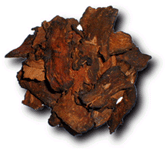
Fo Ti
Introduction
This fact sheet provides basic information about Fo-ti. Fo-ti is native to central and southern China and is distributed in Japan and Taiwan. It is a perennial climbing herb, which can grow to 30 feet in height. The plant has red stems, heart-shaped leaves and white or pink flowers. The roots of 3- to 4-year-old plants are dried in autumn. The stems and leaves are used also.Fo-ti is a popular Chinese tonic herb, dating back to 713 A.D. It is considered one of the country's great four herbal tonics (along with angelica, lycium and panax). Regarded as a rejuvenating plant, fo-ti has been thought to prevent aging and to promote longevity. According to folklore, the older and larger roots have the most power. One source quotes "...300-year-old (root) product makes one immortal."
Common Names
Fo-ti, He shou wu (Chinese), Flowery Knotweed, Climbing Knotweed, Chinese Cornbind. This plant should not be confused with the commercial product Fo-ti Tieng, which does not contain fo-ti.Latin Names
Polygonum multiflorumWhat It Is Used For
- Fo-ti has been used in China for its rejuvenating and toning properties, to increase liver and kidney function and to cleanse the blood. It is also used for insomnia, weak bones, constipation and atherosclerosis. It can increase fertility, increase blood sugar levels and relieve muscle aches and exhibits antimicrobial properties against mycobacteria and malaria.
- The plant is also prescribed for symptoms of premature aging such as gray hair.
How It Is Used
While there is not an official recommended dosage the follow are typical dosages:- Tea: three or more cups per day
- Tablets: 5 of the 500-milligram tablets or capsules 3 times daily
- Fo-ti is used at daily doses of 9 to 15 g of raw herb; however, there do not appear to be any clinical studies supporting this dosage.
What the Science Says
- A Chinese-13-herb mixture ("shou xing bu zhi") that includes fo-ti has been studied for its antisenility effects in mice. Results showed this mixture was effective in slowing the aging process. It is also indicated for insomnia, weak bones, constipation and atherosclerosis. Lifespan and lipid studies of fo-ti in quails have been performed. Fo-ti also has been shown to reduce blood cholesterol levels in animals. The root portion of the plant has exhibited an inhibitory effect on triglyceride accumulation and has reduced enlargement of mice livers.
Side Effects and Cautions
- Some individuals have reported mild side effects from taking fo-ti including mild diarrhea and skin rash.
- Information regarding safety and efficacy in pregnancy and lactation is lacking. Avoid use.






